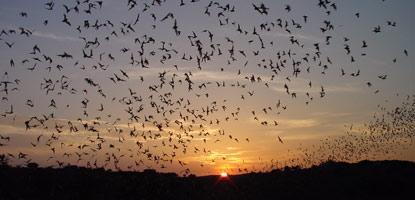Don't Touch that Bat!
- posted: Sep. 23, 2014
Recognizing World Rabies Day

My husband and I recently traveled to New Mexico to visit several National Parks including the amazing Carlsbad Caverns. From May to October, one section of the cavern is home to thousands of Mexican Free-tailed Bats. Park guests are invited to watch as thousands of bats leave the cave at dusk each night to feed. It was quite impressive to see them swirling out of the entrance and filling the night sky. Bats eat huge numbers of insects including mosquitoes and other pests and should not be feared. However, in the United States they are the second leading carriers of rabies. Raccoons are number one, and cats are third in line.
In 2013, 165 raccoons, 76 bats and 40 cats were found to be positive for the rabies virus across the U.S. York County has the second highest number of rabid animals in the state with 21 cases (22 in Chester County) reported last year. And just last month, as we recently reported on our Patton Veterinary Facebook page, there were 5 raccoons, 3 bats, 3 cats, 1 fox and 1 skunk testing positive for rabies in our area. These are unsettling statistics.
Thankfully, cases of human rabies in the United States are uncommon—there have been about 100 cases in the past 50 years. However, a staggering 55,000 people die EACH YEAR from rabies around the globe. Most cases are in Africa and Asia. There are only three people (all children) in the entire world, to have survived the rabies virus without vaccination. Three survivors out of hundreds of thousands of people infected with rabies. This virus is deadly and is still regarded as being 100% fatal. World Rabies Day on September 28, 2014 brings attention to this problem.
So, we all need to do our part to protect the human race from what is actually a 100% preventable disease. What can you do? Number one, vaccinate your pets. Cats, dogs and ferrets and horses should be vaccinated. Even if they live indoors all the time. Even if they never see another person or animal. They NEED to have a rabies vaccine every one to three years depending on their vaccine history and the type of vaccine used. Number two, never touch a sick or injured stray or any wild animal. Contact the PA Game Commission if you see a wild animal suspected of having rabies. Number three. If you are accidentally bitten or scratched by an animal that could have rabies, seek medical attention. Rabies is preventable if vaccinations are given within a short time of being exposed. Please, please, please, protect your pets and your family. Contact the Patton staff about rabies vaccines for all your pets today. Check out more World Rabies Day info on the CDC or AVMA websites.
Photo Credit to the National Parks Service website www.nps.gov.
Location
Patton Veterinary Hospital
425 E Broadway
Red Lion, PA 17356
